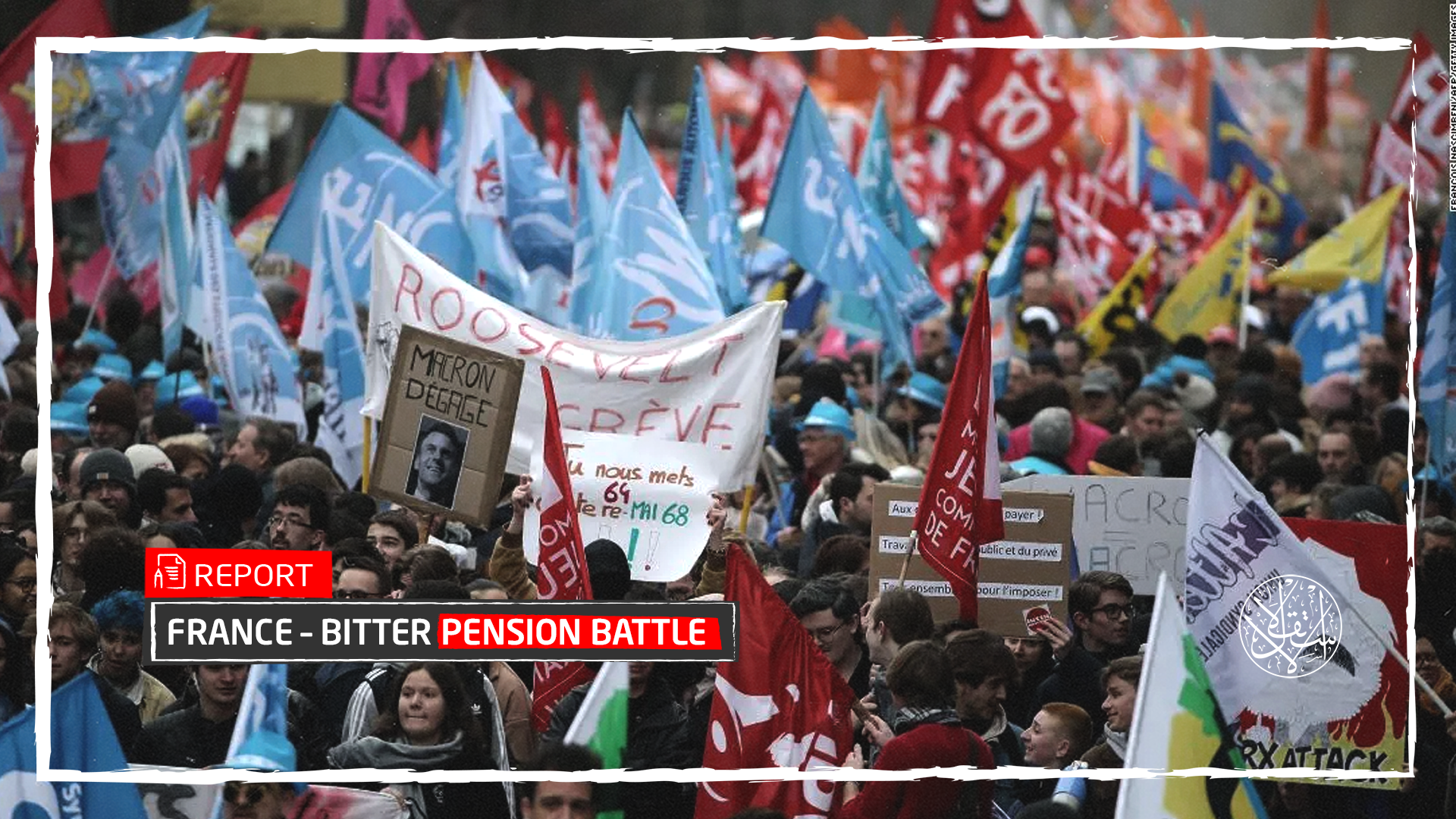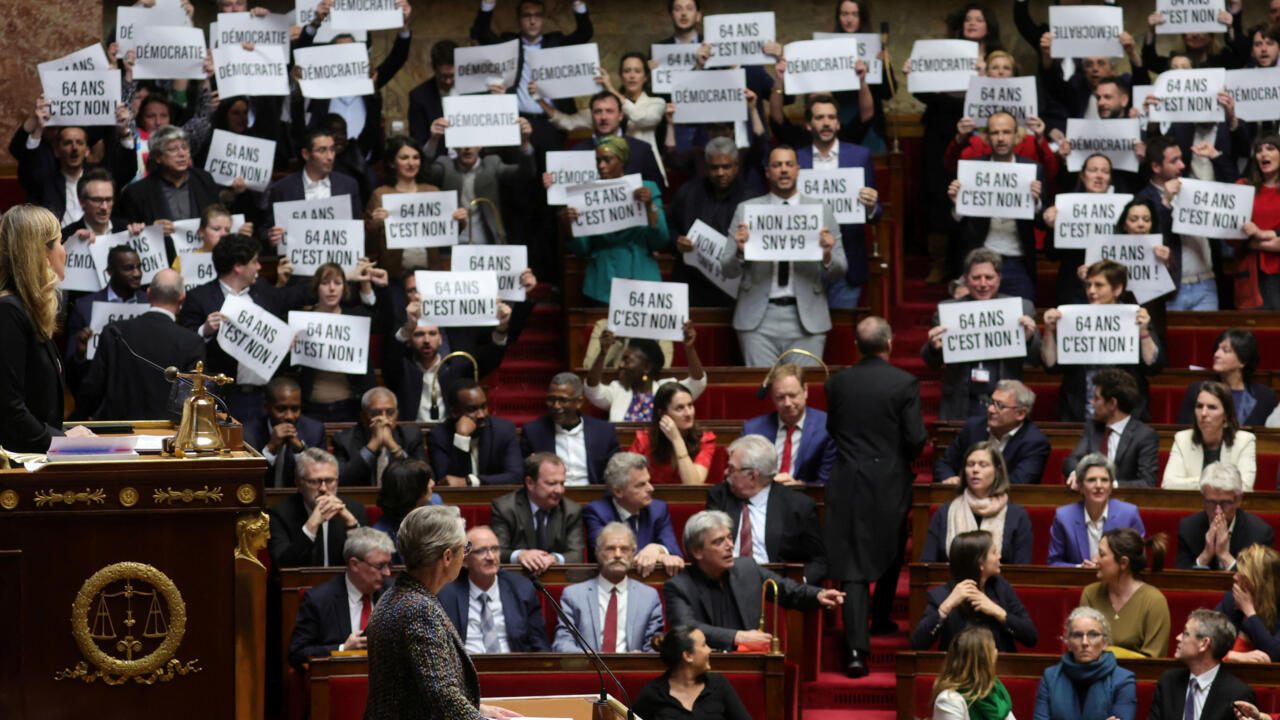How Reform by Force Put the French Government and Macron in the Midst of a Political and Social Crisis

On March 17, 2023, French parties opposed to the retirement age reform law submitted two proposals of no confidence against the government to the National Assembly, following Prime Minister Elizabeth Borne’s use of special constitutional powers to impose the law without Parliament’s approval, at the behest of President Emmanuel Macron, which sparked outrage among opposition members of parliament and prompted them to take action.
This comes amid a political crisis ravaging the country, as millions of French people have demonstrated since January 19, 2023, to express their rejection of this reform, the main clause of which stipulates raising the legal retirement age from 62 to 64 years.
Macron is betting much of his political assets on the project, which represents his most important reform program during his second presidential term, which recently witnessed the exacerbation of social anger, the escalation of protests, and unrest in several regions of the country.
The retirement age in France is among the lowest in Europe, although it is not possible to compare the different systems.
The government justifies raising the retirement age by two years to the need to address the decline in the finances of pension funds and the aging of the population.
Pension Reforms
The French government recently faced two motions of no-confidence in the National Assembly after it used a provision in the constitution that allowed it to pass a pension reform project without a vote of deputies, while President Macron finally called for calm as social tension intensified in France.
However, the divisions in the ranks of the opposition were too great to lead to the overthrow of the Elizabeth Borne government, as on March 20, 2023, the retirement age reform proposed by the French president was finally approved after the failure of the opposition in the National Assembly to no confidence in the government.
Deputies of the independent LIOT group submitted one of the two proposals, and several parties and representatives from the left-wing NUPES coalition participated in signing this proposal.
Also, deputies from the far-right National Rally party, led by Marine Le Pen, in turn submitted another motion of no confidence, confirming that they will vote in favor of all motions of no confidence submitted.
The LIOT group’s motion of no confidence received 278 votes, while a block required 287 votes. Another proposal put forward by the far right received only 94 votes.
The two proposals come as a response to the decision of Emmanuel Macron, who relied on Article 49.3 of the Constitution, which allows the adoption of a text without a vote on it in the National Assembly.
It is noteworthy that this is not the first time that Macron has resorted to this controversial constitutional article, as he used it about 10 times during his second presidential term, which only a few months have passed, but this time it seems that the consequences will not be the same as before.
Labour Minister Olivier Dussopt said that it is not an admission of failure but that it is unfortunate that they resort to an exceptional option to pass the reform.
“The changes to the pension system were too significant to risk a loose ballot after fruitless negotiations with the Republican Party to secure enough votes,” he added.
Le Monde newspaper considered that passing the law by force revealed the isolation of Emmanuel Macron.
The Liberation newspaper said the rest of his five-year term would always face obstacles.

Setback for Macron
Although the French government survived a vote of no-confidence, Macron’s ability to implement his domestic program will falter, as The Economist reported, especially since his position has been severely shaken since his centrist party failed to win an absolute majority in the parliamentary elections last June, amid gains for the extreme right and the radical left.
The dispute over changes to the retirement age also showed how the right could not be counted on to help Macron pass his law.
On his part, Macron expressed, in a letter addressed to the presidents of the Senate and the National Assembly, his desire that the text on retirement be able to proceed to the end of its democratic path amid respect for all, stressing his support for parliament and deputies, and taking all measures to protect the government.
A survey of 2,000 people, the results of which were published in Le Journal du Dimanche, revealed that Macron’s approval rating stands at 28%, its lowest since the widespread yellow vest demonstrations of 2019, which were launched to protest a new fuel tax.

In turn, the Syrian journalist residing in France, Hashem Ali, explained in a statement to Al-Estiklal that “the law of raising the retirement age is a very sensitive issue on more than one level, and it was opposed by trade unions and social groups, which consider themselves greatly affected by it.”
It is noteworthy that some former French presidents had previously tried to take this step, but they collided with a solid wall of opposition and were forced to back down from reforming the retirement age.
“Macron’s resort to Article 3:49 thwarted the opposition’s bet on the law to introduce the law in Parliament,” Mr. Ali said.
“In any case, Macron realizes that he is facing a political risk with great consequences, and he chose to go into the unknown, so as not to take a step back in order to withdraw the law, which he put forward during his presidential campaign a year ago,” he added.
In conclusion, Mr. Ali expected that “France will be managed in the coming period through Article 49.3, in light of the great division within the corridors of Parliament, which will intensify the great popular anger against Macron’s policies.”

Serious Challenge
Since last January 19, millions of French people have demonstrated several times to express their rejection of this reform, the main clause of which is to raise the retirement age from 62 to 64 years, and this clause arouses the greatest anger.
Demonstrators gathered again, on March 19, in several French cities, especially in Paris, where the incidents took place Thursday, Friday, and Saturday evening, denouncing the denial of democracy.
On the social front, several key economic sectors remain in turmoil, particularly transportation, waste collection, and fuel distribution.
The left-wing CGT union said workers would shut down France’s largest oil refinery in Normandy, warning that two more would be closed later.
The strikers contented themselves with preventing fuel shipments from leaving the refineries, but they did not stop their activities completely.
Garbage collection also stopped in most parts of Paris, with about 10,000 tons of waste piled up in the streets, while the government is trying to force some cleaners to resume work.
On March 17, 2023, the four unions representing the railway sector in France called for the continuation of the strike and massive action this week to denounce the passage of the pension reform project.
The Directorate General of Civil Aviation called on airlines to cancel 30% of their flights scheduled for Monday at Orly airport in Paris, and 20% at Provence airport in Marseille in the southeast of the country, due to a strike by air traffic controllers in protest at raising the retirement age.
These moves are the most serious challenge to the authority of the French president since the so-called Yellow Vests Protests after the violent unrest he witnessed on March 17, 2023.
Cars were set on fire in Paris and other French cities during demonstrations attended by thousands.
On RTL radio, Interior Minister Gerald Darmanin said the police had arrested 310 people and vowed to pursue the troublemakers, adding that “the opposition is legitimate, the protests are legitimate, but creating chaos is illegal.”

An opinion poll conducted by Toluna Harris Interactive for RTL Radio showed that more than 8 out of 10 people are not satisfied with the government’s decision to bypass the vote in Parliament and that 65% want the strikes and protests to continue.
Various opinion polls show that the majority of French people oppose this reform, although the number of protesters in the streets and strikers has decreased over time.
Sources
- After Macron’s use of ‘nuclear option’ on unpopular pension reform, what's next?
- Protests resume across France after Macron forced through contested pension reform
- French anger spreads after Macron forces pension age rise
- Has Emmanuel Macron doomed France’s government by pushing through his reforms?
- Emmanuel Macron's 'strongman' move is a sign of weakness
- France’s government survives no-confidence votes and controversial pension reforms will move ahead











